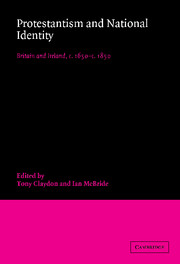Book contents
- Frontmatter
- Contents
- List of contributors
- Acknowledgements
- List of abbreviations
- Introduction
- England
- Britain and Ireland
- Britain, Ireland and the world
- 11 The island race: Captain Cook, protestant evangelicalism and the construction of English national identity, 1760–1800
- 12 A transatlantic perspective: protestantism and national identities in mid-nineteenth-century Britain and the United States
- Index
11 - The island race: Captain Cook, protestant evangelicalism and the construction of English national identity, 1760–1800
Published online by Cambridge University Press: 16 October 2009
- Frontmatter
- Contents
- List of contributors
- Acknowledgements
- List of abbreviations
- Introduction
- England
- Britain and Ireland
- Britain, Ireland and the world
- 11 The island race: Captain Cook, protestant evangelicalism and the construction of English national identity, 1760–1800
- 12 A transatlantic perspective: protestantism and national identities in mid-nineteenth-century Britain and the United States
- Index
Summary
My object [is] nature in its greatest extent; the Earth, the Sea, the Air, the Organic and Animated Creation, and more particularly that class of Beings to which we ourselves belong
J. R. Forster, Observations made during a voyage round the world (1778)The philosophical traveller, sailing to the ends of the earth, is in fact travelling in time; he is exploring the past; every step he makes is the passage of an age. Those unknown islands that he reaches are for him the passage of human society
J.-M. Degerando, The observation of savage peoples (1800)A new world hath lately opened to our view … the innumerable islands, which spot the bosom of the Pacific Ocean … which seem to realise the fabled Gardens of the Hesperides … But amidst these enchanting scenes, savage nature still feasts on the flesh of its prisoners–appeases its Gods with human sacrifices – whole societies of men and women live promiscuously, and murder every infant born among them. Thomas Haweis, sermon to the London Missionary Society, 1795.
‘The island race’: the phrase is used as the title to part I of Winston Churchill's History of the English speaking peoples, a section covering the history of the island of Britain from Celtic society to the Norman conquest. In Churchill's view this period shaped and bequeathed to modernity that mixture of customs, characteristics and racial stock that constituted ‘Englishness’, a composite that would leave its mark, in his words, on ‘every faith, fashion, practice and doctrine’ that came its way. Reviewing the polyphonic mixtures of tribes and cultures that made up.
- Type
- Chapter
- Information
- Protestantism and National IdentityBritain and Ireland, c.1650–c.1850, pp. 265 - 290Publisher: Cambridge University PressPrint publication year: 1998
- 1
- Cited by



